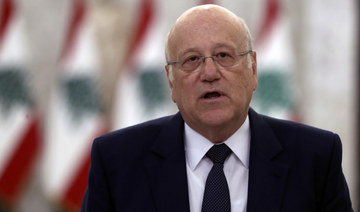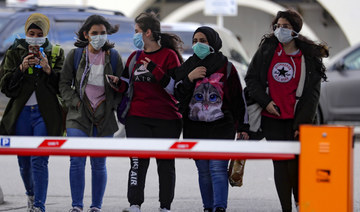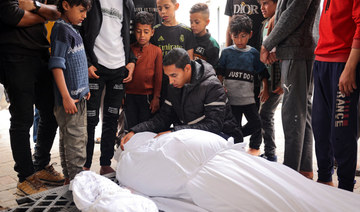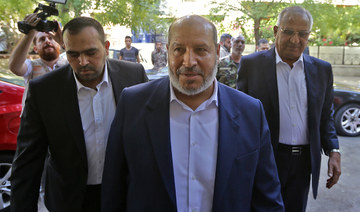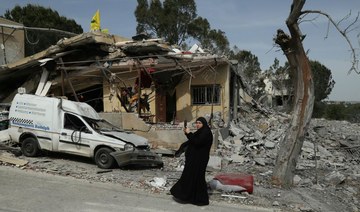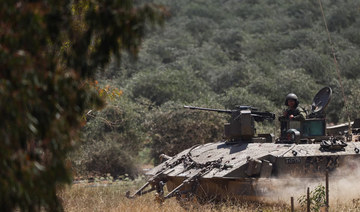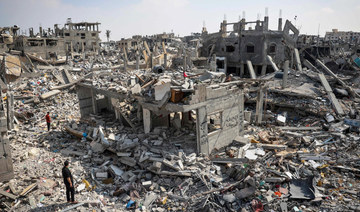DEIR QUBEL: School teacher Claude Koteich, her teenager daughter and 10-year-old son should have all been back in class weeks ago – but a crisis in Lebanon’s education sector has left them lounging at home on a Monday afternoon.
Lebanon’s three-year financial meltdown has severely devalued the country’s pound and drained state coffers, pushing 80 percent of the population into poverty and gutting public services including water and electricity.
It has also left public schools shuttered so far this academic year, with teachers waging an open-ended strike over their severely devalued salaries and administrations worried they won’t be able to secure fuel to keep the lights and heating on during the winter.
Koteich, 44, has taught French literature at Lebanese public schools for exactly half her lifetime.
“We used to get a salary high enough that I could afford to put my kids in private school,” she told Reuters in her living room in the mountain town of Deir Qubel, overlooking the Lebanese capital.
But since 2019, Lebanon’s pound has lost more than 95 percent of its value as other costs skyrocket following the government’s lifting of fuel subsidies and global price jumps.
From a monthly salary that was once about $3,000, Koteich now earns the equivalent of $100 – forcing her to make a tough choice last summer over whether to put her children back in costly private schools or transfer them to a public education system paralyzed by the pay dispute.
“I was stuck between yes and no – waiting for our salaries to change, or if the education minister wanted to fulfill our demands,” Koteich said.
By September, there had been little progress on securing higher salaries given Lebanon’s depleted state coffers. At the same time, her children’s private school was asking for tuition to be paid mostly in cash dollars to guarantee they could afford to pay for expensive fuel and other imported needs.
That would amount to a yearly fee of $500 per student, plus 15 million Lebanese pounds, or about $400.
“I found the number was very high and out of this world for me,” she said.
So as their former classmates don their private school uniforms, Koteich and her two children still have no clear idea when they will return to class.
Lebanon’s education system has long been heavily reliant on private schools, which hosted almost 60 percent of the country’s 1.25 million students, according to the Ministry of Higher Education.
However, the strain on households from Lebanon’s financial collapse has forced a shift: around 55,000 students transitioned from private to public schools in the 2020-2021 school year alone, the World Bank has said.
But public education has been historically underfunded, with the government earmarking less than 2 percent of GDP to education in 2020, according to the World Bank — one of the lowest rates in the Middle East and North Africa.
And the combined stresses of recent years – from an influx of Syrian refugees starting in 2011 to the COVID-19 pandemic and the port blast which damaged Beirut – has beleaguered schools.
“My students’ worries are beyond educational – they started to think about how they can make a living. This age is supposed to be thinking of their homework,” Koteich said.
The head of the United Nations’ children agency UNICEF in Lebanon told Reuters that about one third of children in Lebanon – including Syrian children – are not attending school.
“We have worrying numbers of an increase in children being employed in Lebanon, and girls getting into early child marriage,” said Edouard Beigbeder.
A UNICEF study this year found that 38 percent of households had reduced their education expenses compared with just 26 percent in April 2021. This trend makes a return to class ever more important.
Some hope schools will re-open in October, although there has been no such indication from the government.
“There’s a kind of race against the clock to ensure the first week of October, we will have the right kind of opening,” Beigbeder said.
Teachers’ strike and soaring fees: Lebanon’s public school pupils miss class
https://arab.news/56v6y
Teachers’ strike and soaring fees: Lebanon’s public school pupils miss class
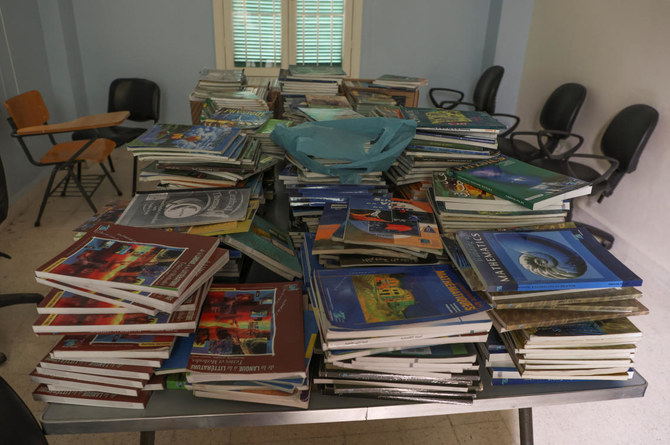
- Lebanon’s three-year financial meltdown has left public schools shuttered so far this academic year
- Teachers wage an open-ended strike over their severely devalued salaries
Hamas official says delegation to respond to Gaza truce plan in Egypt Monday
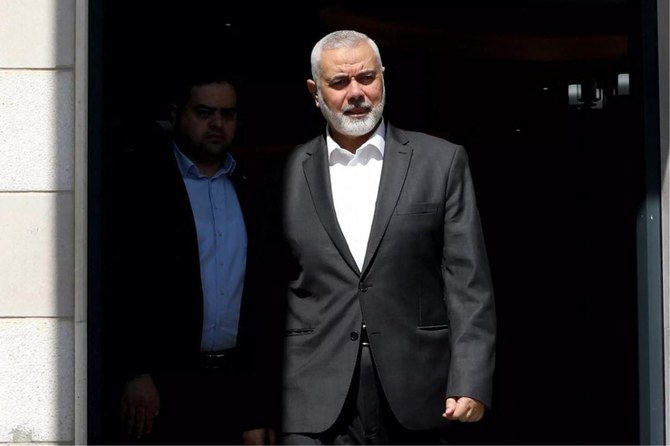
- There is growing international pressure for Hamas and Israel to reach a ceasefire deal and avert an Israeli attack on Rafah
- Hamas delegation to visit Cairo on Monday for ceasefire talks
TEL AVIV: A senior Hamas official on Sunday said that the group would deliver its response to Israel’s latest counterproposal for a Gaza ceasefire on Monday in Egypt.
“A Hamas delegation headed by Khalil Al-Hayya will arrive in Egypt tomorrow... and deliver the movement’s response” to the Israeli proposal during a meeting with Egyptian intelligence officials, said the official who declined to be named told AFP.
Mediator Egypt had sent its own delegation to Israel this week to jump-start stalled negotiations even as fighting in the Gaza Strip rages.
Egypt, Qatar and the United States have been unsuccessfully trying to broker a new Gaza truce deal ever since a one-week halt to the fighting in November saw 80 Israeli hostages exchanged for 240 Palestinians held in Israeli prisons.
Earlier, a senior Qatari official has urged both Israel and Hamas to show “more commitment and more seriousness” in ceasefire negotiations in interviews with Israeli media, as pressure builds on both sides to move toward a deal that would set Israeli hostages free and bring potential respite in the nearly 7-month-long war in Gaza.
The interviews with the liberal daily Haaretz and the Israeli public broadcaster Kan were published and aired Saturday evening. They came as Israel still promises to invade Gaza’s southernmost city of Rafah despite global concern for hundreds of thousands of Palestinians sheltering there and as the sides are exchanging proposals surrounding a ceasefire deal.
Qatar, which hosts Hamas headquarters in Doha, has been a key intermediary throughout the Israel-Hamas war. Along with the US and Egypt, Qatar was instrumental in helping negotiate a brief halt to the fighting in November that led to the release of dozens of hostages.
The sides have held numerous rounds of negotiations since, none of which produced an additional truce. In a sign of its frustration, Qatar last week said it was reassessing its role as mediator.
In the interviews, Qatar’s Foreign Ministry spokesperson Majed Al-Ansari expressed disappointment in both Hamas and Israel, saying each side has made its decisions based on political interests and not with the good of civilians in mind.
“We were hoping to see more commitment and more seriousness on both sides,” he told Haaretz.
He did not reveal details of the current state of the talks, other than to say they have “effectively stopped,” with “both sides entrenched in their positions.”
“If there is a renewed sense of commitment on both sides, I’m sure we can reach a deal,” he said.
The Israeli journalists conducted the interviews in Qatar, which has no formal diplomatic ties with Israel.
Relations between Qatar and Israel have been strained throughout the war, as some politicians in Israel, including Prime Minister Benjamin Netanyahu, have criticized Qatar for not putting enough pressure on Hamas.
Israeli legislators have also cleared the way for the country to expel Al Jazeera, the Qatar-owned broadcaster.
Al-Ansari’s remarks came after an Egyptian delegation had discussed with Israeli officials a “new vision” for a prolonged ceasefire in Gaza, according to an Egyptian official, who spoke on condition of anonymity to freely discuss the developments.
Hamas meanwhile said Saturday it was reviewing a new Israeli proposal for a ceasefire, which came in response to a Hamas proposal from two weeks ago.
Negotiations earlier this month centered on a six-week ceasefire proposal and the release of 40 civilian and sick hostages held by Hamas in exchange for freeing hundreds of Palestinian prisoners in Israeli jails.
There is growing international pressure for Hamas and Israel to reach a ceasefire deal and avert an Israeli attack on Rafah.
A letter penned by US President Joe Biden along with 17 other world leaders urged Hamas to release the hostages immediately.
Hamas in recent days has released new videos of three hostages it holds, which appear to be meant to push Israel to make concessions.
Israel meanwhile has massed dozens of tanks and armored vehicles ahead of an expected offensive in Rafah, where more than half of Gaza’s 2.3 million population is seeking shelter. The planned incursion has raised global alarm because of concerns over potential harm to civilians. The troop buildup may also be a pressure tactic on Hamas in the truce talks.
Israel sees Rafah as Hamas’ last major stronghold and has vowed to attack the militant group there in its bid to destroy its military and governing capabilities.
The war was sparked with Hamas’ attack on Oct. 7 into southern Israel, which killed 1,200 people, mostly civilians, according to Israeli authorities, who say another 250 people were taken hostage. Hamas and other groups are holding about 130 people, including the remains of about 30, Israeli authorities say.
Israel’s retaliatory assault on Hamas has killed more than 34,000 people, most of them women and children, according to health authorities in Gaza, who do not distinguish between civilians and combatants in their tally. The Israeli military says it has killed at least 12,000 militants, without providing evidence to back the claim.
France to make proposals in Lebanon to prevent war between Hezbollah and Israel
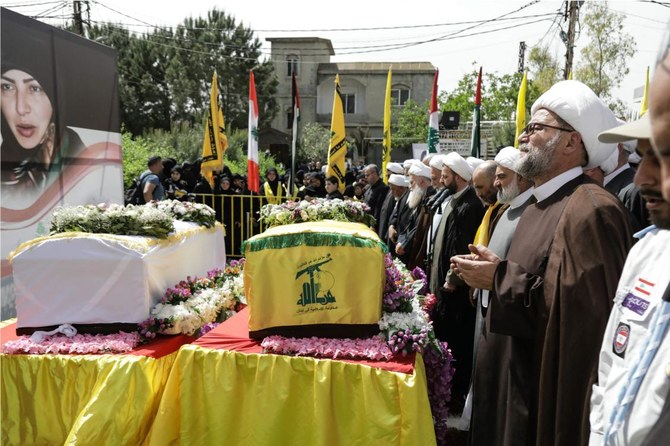
NAQOURA: France’s foreign minister said that he would make proposals to Lebanese officials on Sunday aimed at easing tensions between Hezbollah and Israel and preventing a war breaking out.
“If I look at the situation today if there was not a war in Gaza, we could be talking about a war in southern Lebanon given the number of strikes and the impact on the area,” Stephane Sejourne said after visiting the United Nations peace keeping force in Naqoura, southern Lebanon.
“I will pass messages and make proposals to the authorities here to stabilize this zone and avoid a war.”
France’s foreign minister looks to prevent Israel-Hezbollah conflict escalation in Lebanon visit
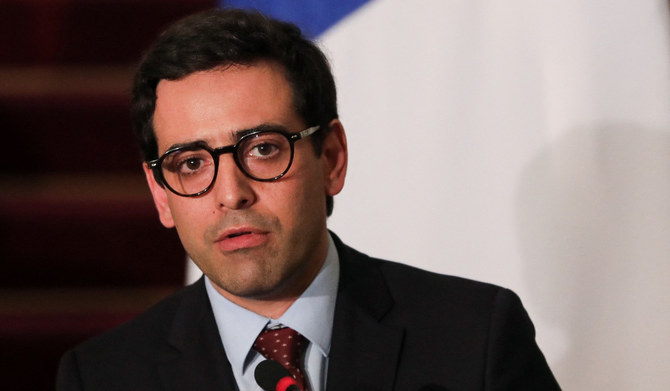
- Israel has killed more than 34,000 Palestinians, according to Gaza’s Health Ministry
- Israel has remained cautious on the French initiative, although Israeli and French officials say Israel supports efforts to defuse the cross-border tensions
BEIRUT: France’s foreign minister will push proposals to prevent further escalation and a potential war between Israel and Iran-backed Hezbollah during a visit to Lebanon on Sunday as Paris seeks to refine a roadmap that both sides could accept to ease tensions.
France has historical ties with Lebanon and earlier this year Stephane Sejourne delivered an initiative that proposed Hezbollah’s elite unit pull back 10 km (6 miles) from the Israeli border, while Israel would halt strikes in southern Lebanon.
The two have exchanged tit for tat strikes in recent months, but the exchanges have increased since Iran launched a barrage of missiles on Israel in response to a suspected Israeli attack on the Iranian embassy in the Syrian capital Damascus that killed members of Iran’s Revolutionary Guards Corps’ overseas Quds Force.
France’s proposal, which has been discussed with partners, notably the United States, has not moved forward, but Paris wants to keep momentum in talks and underscore to Lebanese officials that Israeli threats of a military operation in southern Lebanon should be taken seriously.
Hezbollah has maintained it will not enter any concrete discussion until there is a ceasefire in Gaza, where the war between Israel and Islamist militant group Hamas has entered its sixth month.
Israel has also said it wants to ensure calm is restored on its northern border so that thousands of displaced Israelis can return to the area without fear of rocket attacks from across the border.
“The objective is to prevent a regional conflagration and avoid that the situation deteriorates even more on the border between Israel and Lebanon,” foreign ministry deputy spokesperson Christophe Lemoine said at a news conference.
Lebanese Prime Minister Najib Nikati and Lebanese army chief Joseph Aoun met French President Emmanuel Macron earlier this month, where they discussed the French proposal.
In a letter addressed to the French embassy in Beirut in March, Lebanon’s foreign ministry said Beirut believed the French initiative would be a significant step toward peace and security in Lebanon and the broader region.
Local Lebanese media had reported the government had provided feedback to the French on the proposal.
French officials say the responses so far have been general and lack consensus among the Lebanese. While they deem it too early for any form of accord, they believe it is vital to engage now so that when the moment comes both sides are ready.
Paris will also underline the urgency of breaking the political deadlock in the country. Lebanon has neither a head of state nor a fully empowered cabinet since Michel Aoun’s term as president ended in October 2022.
Israel has remained cautious on the French initiative, although Israeli and French officials say Israel supports efforts to defuse the cross-border tensions.
“The flames will flicker and tensions will continue,” said a Lebanese diplomat. “We are in a situation of strategic ambiguity on both sides.”
France has 700 troops based in southern Lebanon as part of the 10,000-strong United Nations peacekeeping force.
Officials say the UN troops are unable to carry out their mandate and part of France’s proposals are aimed at beefing up the mission by strengthening the Lebanese army.
After Lebanon, Sejourne will head to Saudi Arabia before traveling to Israel.
Arab and Western foreign ministers, including US Secretary of State Antony Blinken, will hold informal talks on the sidelines of a World Economic Forum event in Riyadh to discuss the Gaza war with Palestinian President Mahmoud Abbas.
32 more killed in Gaza as Hamas studies new Israeli truce proposal
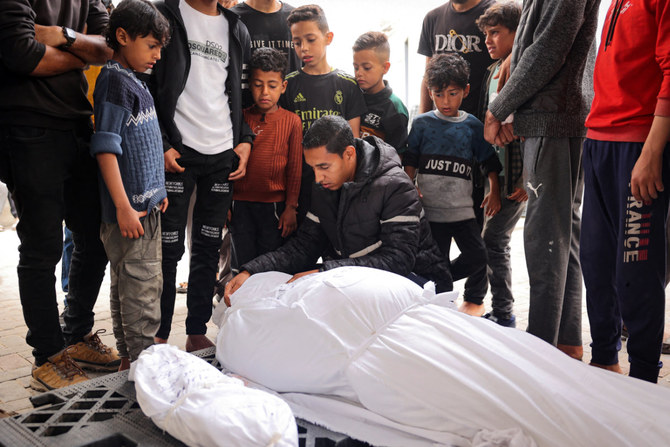
- Mediators working on compromise that will answer most of main demands
- Minister says Israel a deal could lead to suspension of planned Rafah offensive
JEDDAH/GAZA STRIP: Palestinians in Rafah said on Saturday they were living in “constant terror” as Israel vows to push ahead with its planned assault on the south Gaza city flooded with displaced civilians.
The Israeli military has massed dozens of tanks and armored vehicles in southern Israel close to Rafah and hit locations in the city in near-daily airstrikes.
“We live in constant terror and fear of repeated displacement and invasion,” said Nidaa Safi, 30, who fled Israeli strikes in the north and came to Rafah with her husband and children.
Gaza’s Health Ministry said at least 34,388 people have been killed in the besieged territory during more than six months of war between Israel and Hamas militants.
The tally includes at least 32 deaths in the past 24 hours, a ministry statement said, adding that 77,437 people have been wounded in the Gaza Strip since the war broke out when Hamas militants attacked Israel on Oct. 7.
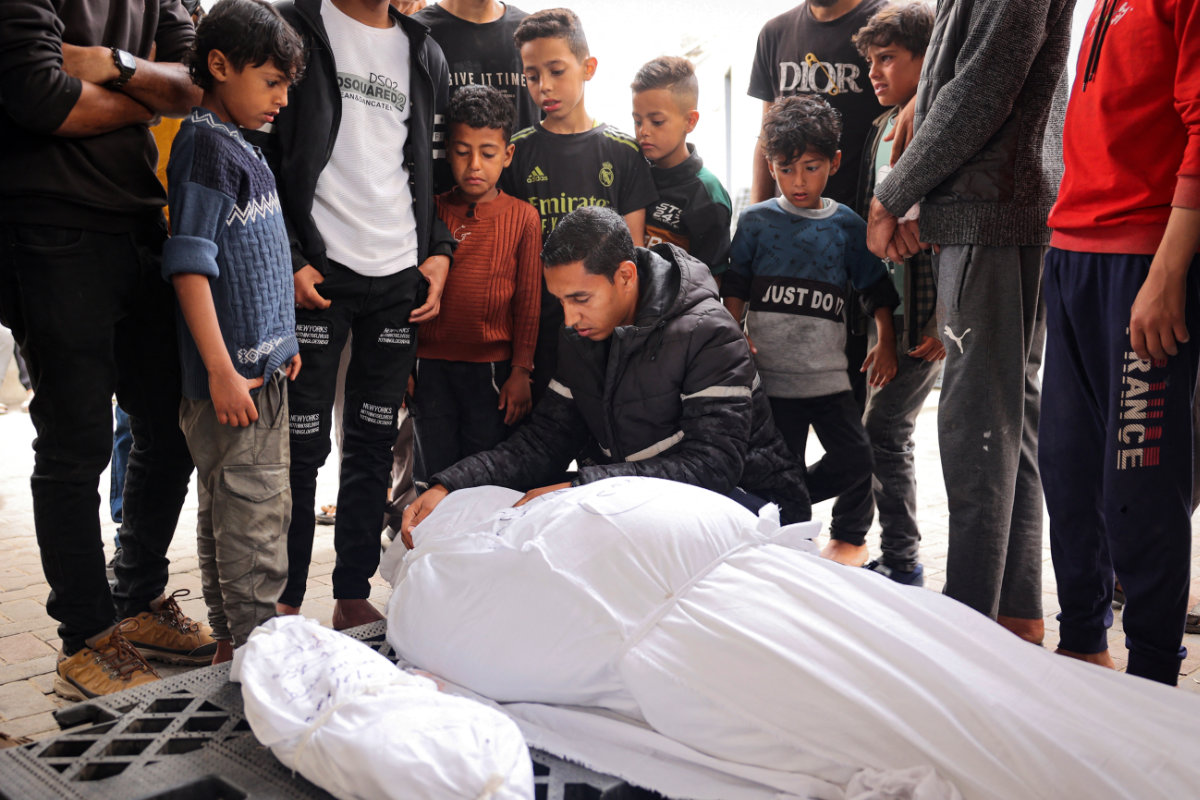
Early Saturday, an airstrike hit a house in Rafah’s Tel Sultan neighborhood, killing a man, his wife and their sons, ages 12, 10 and 8, according to records of the Abu Yousef Al-Najjar hospital’s morgue. A neighbor’s 4-month-old girl was also killed.
Ahmed Omar rushed with other neighbors after the 1:30 a.m. strike to look for survivors, but said they only found bodies and body parts. “It’s a tragedy,” he said.
An Israeli airstrike later Saturday on a building in Rafah killed seven people, including six members of the Ashour family, according to the morgue.
Five people were killed in the Nuseirat refugee camp in central Gaza overnight when an Israeli strike hit a house, according to officials at the Al-Aqsa Martyrs Hospital.
Elsewhere, Israeli forces shot and killed two Palestinian men at a checkpoint in the Israeli-occupied West Bank, the military said. It said the men had opened fire at troops stationed at Salem checkpoint near the city of Jenin.
Violence in the West Bank has flared since the war. The Ramallah-based Health Ministry says 491 Palestinians have been killed by Israeli fire.
Israel's counterproposal
Hamas said it was studying Israel’s latest counterproposal for a ceasefire, a day after reports said a delegation from mediator Egypt was in Israel trying to jump-start stalled negotiations.
Israel’s foreign minister said that the Rafah incursion could be suspended should there be a deal to secure the release of Israeli hostages.

“The release of the hostages is the top priority for us,” said Israel Katz. “If there will be a deal, we will suspend the operation.”
The Egyptian delegation discussed a “new vision” for a prolonged ceasefire in Gaza, according to an Egyptian official, who spoke on condition of anonymity to freely discuss the developments.
It wasn’t immediately clear whether Israel’s proposal was directly related to the visit.
Khalil Al-Hayya, deputy head of Hamas’s political arm in Gaza, said it had “received the official Zionist occupation response to the movement’s position, which was delivered to the Egyptian and Qatari mediators on April 13.”
Negotiations earlier this month centered on a six-week ceasefire proposal and the release of 40 civilian and sick hostages in exchange for freeing hundreds of Palestinian prisoners in Israeli jails.
A separate Hamas statement said leaders from the three main militant groups active in Gaza discussed attempts to end the war. It didn’t mention the Israeli proposal.
The armed wing of Hamas also released video footage of two men held hostage in Gaza, identified by Israeli campaign group the Hostages and Missing Families Forum as Keith Siegel and Omri Miran.
Mediators are working on a compromise that will answer most of both parties’ main demands, which could pave the way to continued negotiations with the goal of a deal to end the war, the official said.
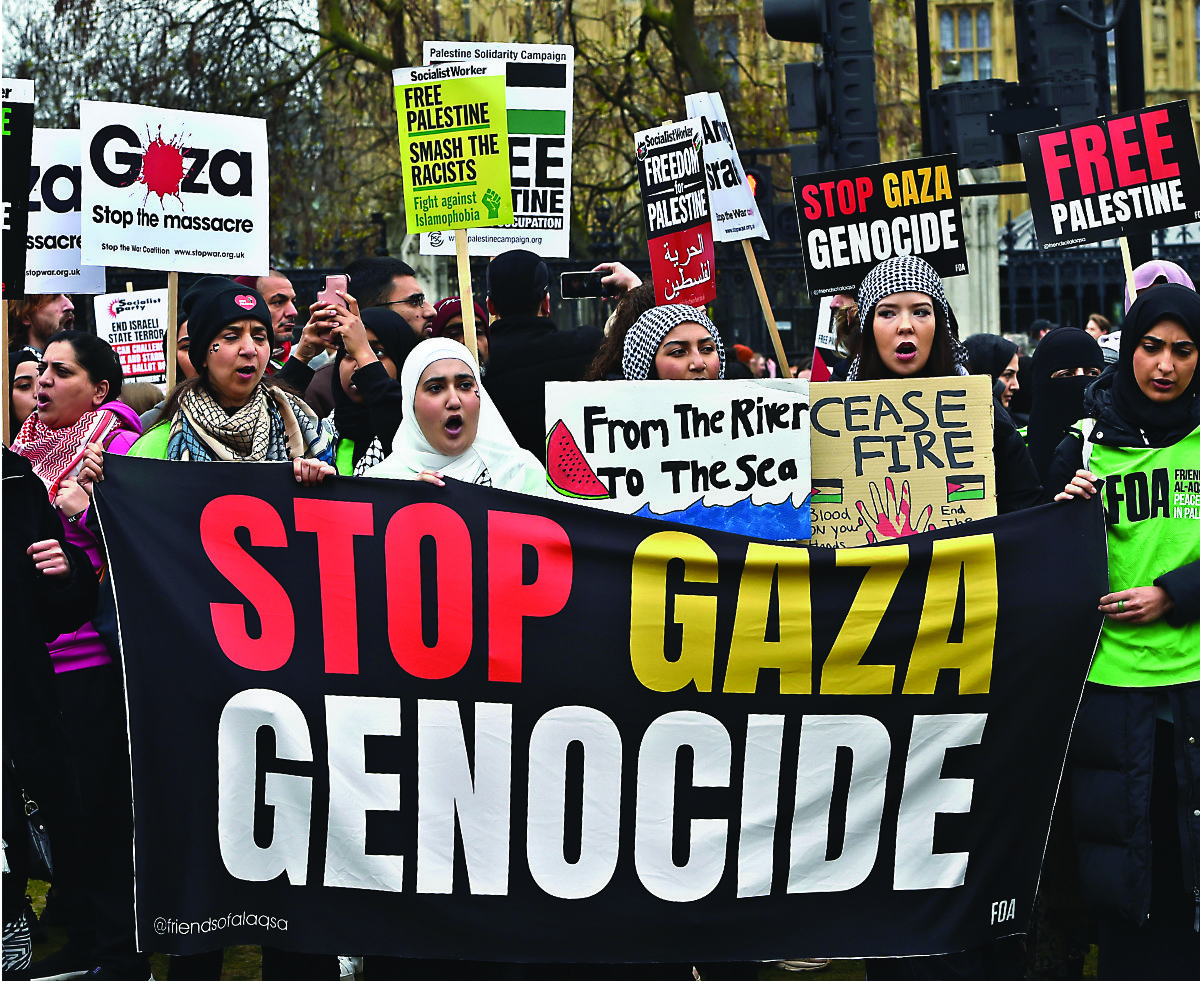
Hamas has said it won’t back down from demands for a permanent ceasefire and full withdrawal of Israeli troops.
Israel has rejected both and said it will continue military operations until Hamas is defeated and that it will retain a security presence in Gaza.
There is growing international pressure for Hamas and Israel to reach a ceasefire deal and avert an Israeli attack on Rafah, where more than half of Gaza’s 2.3 million people have sought refuge.
Israel has insisted for months it plans a ground offensive into Rafah, on the border with Egypt, where it says many remaining Hamas militants remain, despite calls for restraint including from Israel’s staunchest ally, the United States.
Egypt has cautioned an offensive into Rafah could have “catastrophic consequences” on the humanitarian situation in Gaza, where famine is feared, and on regional peace and security.
Tolerating Israeli abuses
Washington has been critical of Israeli policies in the West Bank. US Secretary of State Antony Blinken, who is expected in Israel on Tuesday, recently determined an army unit committed rights abuses there before the war in Gaza.
But Blinken said in an undated letter to US House Speaker Mike Johnson, obtained by The Associated Press on Friday, that he’s postponing a decision on blocking aid to the unit to give Israel more time to right the wrongdoing. Blinken stressed that overall US military support for Israel’s defense wouldn’t be affected.
The US has also been building a pier to deliver aid to Gaza through a new port. Israel’s military confirmed Saturday that it would be operational by early May.
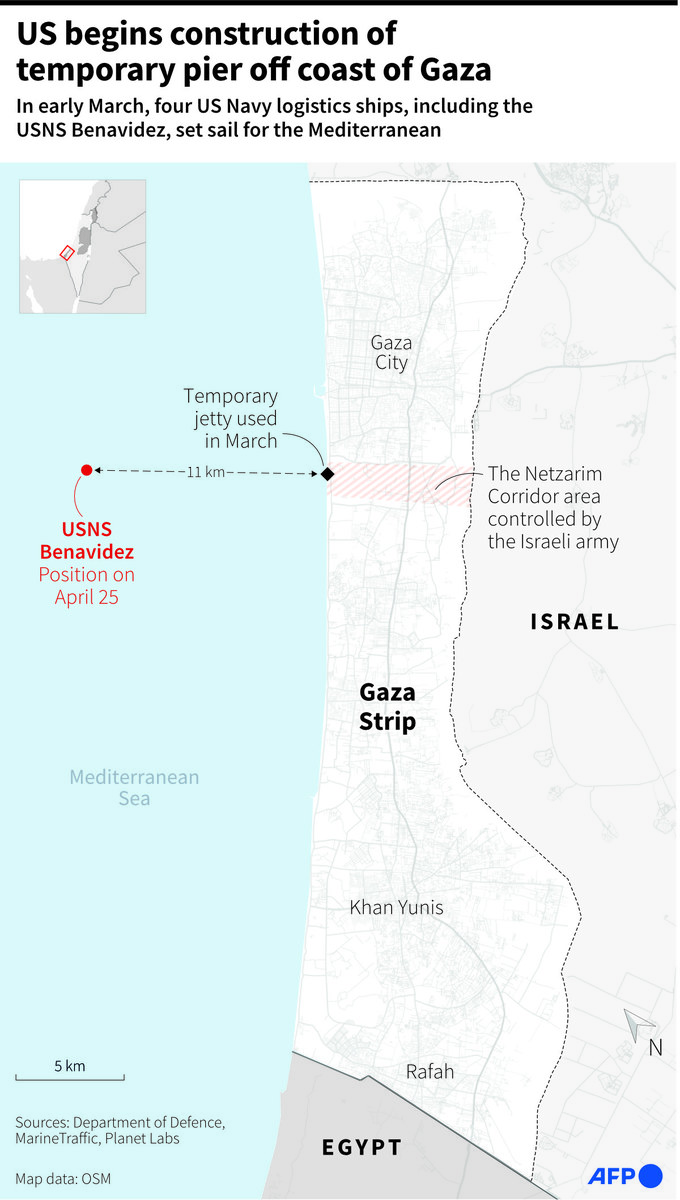
The BBC reported the UK government was considering deploying troops to drive the trucks to carry the aid to shore, citing unidentified government sources. British officials declined to comment.
Another aid effort, a three-ship flotilla coming from Turkiye, was prevented from sailing, organizers said.
Student protests over the war and its effect on Palestinians are growing on college campuses in the US, while demonstrations continue in many countries.
Hamas sparked the war by attacking southern Israel on Oct. 7, with militants killing around 1,200 people, mostly civilians, and taking around 250 hostage. Israel says the militants still hold around 100 hostages and the remains of more than 30 others.
Sudan demands emergency UN meeting on UAE ‘aggression’
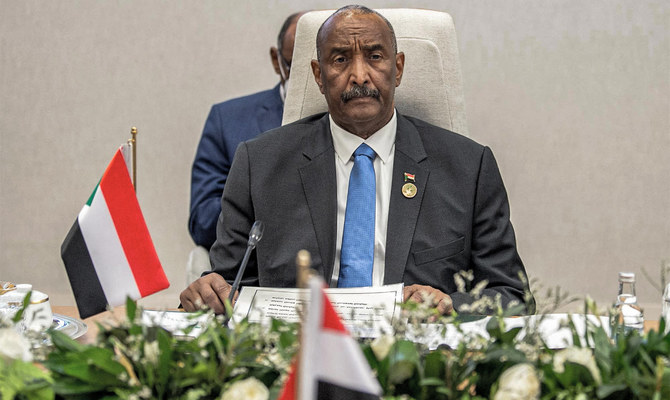
- For months the regular army has accused the United Arab Emirates of supporting the RSF, a charge the UAE denies
PORT SUDAN, Sudan: Sudan has requested an emergency UN Security Council meeting on what it calls UAE “aggression” for allegedly supporting paramilitaries battling the army, a diplomatic source said Saturday.
The fighting broke out in April last year between the regular army, headed by Sudan’s de facto leader Abdel Fattah Al-Burhan, and the paramilitary Rapid Support Forces (RSF) led by his former deputy Mohamed Hamdan Dagalo.
For months the regular army has accused the United Arab Emirates of supporting the RSF, a charge the UAE denies.
“Yesterday, our permanent representative to the United Nations submitted a request for an urgent session of the Security Council to discuss the UAE’s aggression against the Sudanese people, and the provision of weapons and equipment to the terrorist militia,” the source told AFP.
The country’s official SUNA news agency confirmed that Sudan’s UN representative, Al-Harith Idriss, had submitted the request.
SUNA cited Idriss as saying this was “in response to the UAE representative’s memorandum to the Council,” and that “the UAE’s support for the criminal Rapid Support militia that waged war on the state makes the UAE an accomplice in all its crimes.”
In a letter to the Security Council last week, the UAE foreign ministry rejected Sudan’s accusations that it backs the RSF.
The letter said the allegations were “spurious (and) unfounded, and lack any credible evidence to support them.”
Separately on Saturday, the UN Security Council expressed “deep concern” over escalating fighting in Sudan’s North Darfur region and warned against the possibility of an imminent offensive by the RSF and allied militias on El Fasher.
The city is the last Darfur state capital not under RSF control and hosts a large number of refugees.
United Nations officials put out similar warnings Friday, with the UN’s High Commissioner for Human Rights Volker Turk expressing his “grave concern.”
Secretary-General Antonio Guterres’ spokesperson’s office said an attack on El Fasher “would have devastating consequences for the civilian population... in an area already on the brink of famine.”
The Sudan war has killed tens of thousands of people and forced more than 8.5 million people to flee their homes in what the United Nations has called the “largest displacement crisis in the world.”
In December, Khartoum demanded that 15 Emirati diplomats leave the country after an army commander accused Abu Dhabi of supporting the RSF, and protests in Port Sudan demanded the expulsion of the UAE ambassador.
The Wall Street Journal, citing Ugandan officials, reported last August that weapons had been found in a UAE cargo plane transporting humanitarian aid to Sudanese refugees in Chad, prompting a denial from Abu Dhabi.



